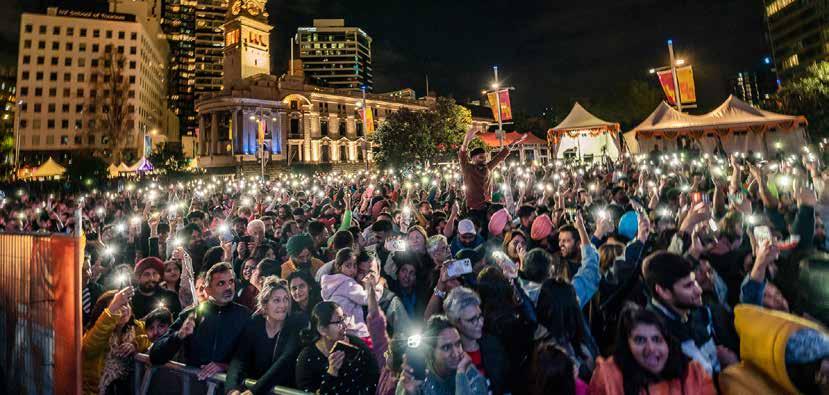
4 minute read
Kiwi-Indian Diaspora is NZ’s Biggest Untapped Economic Asset: Bhav Dhillon
Kiwi-Indian Diaspora is NZ’s Biggest Untapped Economic Asset
Despite the fact that Kiwi-Indians are almost the largest migrant group, there’s a general lack of ‘India literacy’ in Aotearoa’s public and private discourse. Its potential in unleashing trade growth between our two countries needs urgent attention, opines Bhav Dhillon, Hon Consul of India in Auckland.
Following the global Indian Diaspora-centric vision of Prime Minister Narendra Modi, the recent highprofile visit of Indian External Affairs Minister Dr S. Jaishankar to New Zealand was centred around the annual Indian Weekender Kiwi-Indian Hall of Fame awards, along with a busy schedule of bilateral official engagements.
Undoubtedly, the Kiwi-Indian diaspora is one of the biggest untapped economic assets we possess. Despite the fact that Kiwi-Indians are almost the largest migrant group, there’s a general lack of ‘India literacy’ in Aotearoa’s public and private discourse. Its potential in unleashing trade growth between our two countries needs urgent attention.
Just as the world at large has done for some time, It is high time that Kiwis and the political establishment see India and Kiwi-Indians beyond the cliche of Diwali, Bollywood, curry and cricket.
At about 300k Kiwi-Indians comprise some 6% of the population. With their median age here being 30 – NZ’s is 38 – this cohort is playing a significant role in the small business and service industry, the NZ economy’s backbone. It made its impact during Covid, as when majority of us were locking ourselves up in the safety of our homes, they were nursing patients, driving buses, manning fuel stations, running grocery stores and drove trucks, maintaining critical supply chains.
Kiwi-Indians’ growing influence in NZ is concomitant to the growth and re-emergence of India on the global political and economic scene. As India celebrates 75 years of independence, it has outpaced the UK to become the world’s fifth largest economy and is on track for the third spot. India now has the highest number of unicorns and is feted as the start-up and digital capital of the world, with high inflows of foreign direct investment. The world is beating a path to India, Australia included. Is India on top of NZ’s priority list of countries to engage with? If not, why not?
Taking a leaf out of Australia’s India book
Culturally, Indians develop strategic relationships first and then enter the transactional phase which results in trade. Australia has laid out a clear, successful model pathway for NZ to follow.
Australia left no stone unturned in expending its political capital to develop and deepen strategic relationship with India. The warm friendship between the Indian and Australian prime ministers was palpable even over social media as they effectively engaged with each other almost on a weekly basis.
The results are before us: Australia is reaping the benefits with the recently concluded India-Australia Comprehensive Economic Cooperation Agreement providing access to more than 90% of goods and services to each other’s market.
It is proven beyond doubt that this trade agreement came into play only after there was significant investment in the development and improvement of strategic relationship and convergence of mutual interests, thereby creating real win-win outcomes for both nations.
Agreed, Australia has some heft due to its size and scale, but that is where we need to realise and accept that NZ has to work harder, as evidently in terms of trade there are more wins for NZ and less for India. The current balance of trade is also in NZ’s favour. Due to this imbalance, NZ needs to put in extraordinary effort especially as it urgently needs to spread its risk in global trade by harnessing the burgeoning buying power of the Indian middle class.
Successive NZ governments have also failed to lobby hard for a direct flight between NZ and India, despite Auckland Airport presenting a case for the commercial viability of direct flights. Qantas now flies direct to three major Indian cities.
While NZ remains steadfastly focused on transacting or selling its dairy and meat, India, on the other hand, maintains its long-held position that strategic relationship building will define future trade agreements. The result of this mismatch is that India is no where near the top as a trading partner and instead is at number 15 with bilateral trade languishing at a woefully sub-par $2 billion.
NZ must ditch its unworkable trade-first approach and work to deepen and broaden its strategic relationship with India before it can expect any significant market access and trade agreements.
India is a complex market but the pot of gold at the end of the rainbow is worth the effort. NZ has the wherewithal to navigate this complexity: the highly educated, experienced and entrepreneurial Kiwi-Indian diaspora. NZ companies should hire them to front their India strategy. Policy is made by governments but passion and action emanates from people.
The recent visit to India by Minister Damien O’Connor with an India NZ Business Council delegation is a welcome step. How much importance and engagement NZ displays during the upcoming visit of Minister Dr. S Jaishankar is to be seen.
Despite the challenges, India and NZ are on the cusp of an exciting, meaningful and strategic phase of friendship and economic partnership, effectively fuelled by the existing people-to-people bridge.
A version of this article first appeared in the New Zealand Herald on October 3, 2022.

Bhav Dhillon
Hon Consul of India in Auckland, New Zealand
Bhav Dhillon is the Honorary Consul of India, a well-known community and business leader and publisher of The Indian Weekender, NZ’s weekly newspaper for Kiwi-Indians. Bhav is Managing Director of Cemix (construction products manufacturer) and sits on the board of several other organisations, including the India New Zealand Business Council. He is also the ex-chair of Foundation North.











